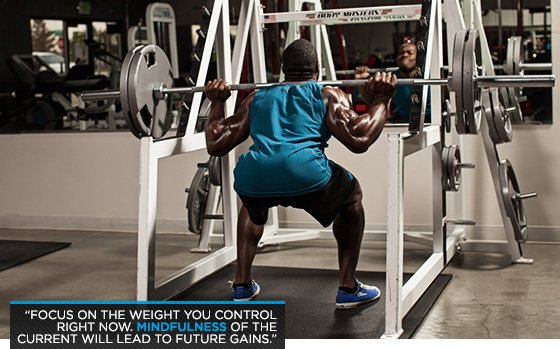
The Power Of Focus: How To Stop Going Through The Motions
Last July, I began a different journey, which has improved my fitness mindset far more than any individual lifting achievement. I started meditating.
Believe me, this is not something I ever thought I'd be doing. But here I am, sitting by myself nearly every day, in silence, counting my breath. I used to scoff at people who did things like this, because I deemed it a monumental waste of time.
I've since changed my mind, and I'm glad I did. Over the ensuing months, I've written a lot about the concept of mindfulness on my personal blog, and I advocate mindfulness training for anyone who wants to enjoy training and eating more, and worry about them less. Now I'd like to give you some ideas of what it's like to be more mindful about your fitness and nutrition.
What is Mindfulness? ///
Have you ever noticed yourself doing a certain task, but find your
mind in a completely different place? This is the opposite of
mindfulness.Imagine yourself driving. The last thing you're thinking about is how the steering wheel feels in your hand, the sounds you hear, or what is happening all around you. You struggle to fumble through your Facebook feed while changing the radio station. What about when you're on the phone with someone, but grocery shopping at the same time? Your attention is somewhere, but it's probably not where you are.

Mindfulness, in short, is being consciously aware of what you're doing at any given moment. You observe thoughts, feelings, sensations, and without judgment. Of course there are other definitions, primarily derived from Buddhism, but this will work for now.
Why I Needed Mindfulness ///
When I used to train, my thoughts were always on the future. I was
wrapped up in goals, both in the short term and the long term.For the short term, it was all about progressive overload: Last Wednesday, I hit all my reps on squats; today, I'll increase the weight. Next time… In the longer term, I was obsessed with how much I was going to be able to lift at the end of a specific training block, or how much muscle I might gain. Through it all I was worried about how to fit in all of my sessions with a busy schedule.
My mind was never in the present. I rarely focused on what I was doing. Sure, I recorded my sets and reps and made sure to progress, but after a point, training wasn't much fun anymore, and I couldn't figure out why.

The same goes for my relationship with food. I rarely took the time to actually enjoy my meals. Rather, I normally made something quick, wolfed it down, and got back to work. It was especially evident when I'd go out to eat with friends, and I scarfed my meal down very quickly without much thought or focus.
Around the holidays it was even worse. I used to become a real glutton then, embracing the challenge to see how much food I could cram into myself. I pigged out merely because I could, only to feel like a sack of crap afterward. I wasn't proud of this.
Finding Mediation ///


 I was first exposed to meditation and mindfulness a few years ago,
but never gave it much thought until the summer of 2012. Life and work
were moving so quickly, and I found that when I tried to relax, it just
wasn't happening.
I was first exposed to meditation and mindfulness a few years ago,
but never gave it much thought until the summer of 2012. Life and work
were moving so quickly, and I found that when I tried to relax, it just
wasn't happening. I began to read more and more about how to meditate, and incorporate mindfulness into my life. I finally made the decision to begin meditating for two reasons:
- I needed peace: I needed to learn how to relax and not become overwhelmed. My mind was constantly racing, and as a result, I tended to neglect things like sleep, time away from work, and even casual social outings such as coffee or lunch with friends.
- I needed a challenge: Everything I read about meditation said that sitting in silence for longer than two minutes was difficult. It's true; meditation is hard as hell. The goal is to focus on something—it can be your breath, a candle flame, a thought, or whatever else—and only that one thing. This isn't as simple as it sounds. The first thing I experienced was the challenge. Later I experienced the peace.
Coming into Focus ///
I decided to start with just five minutes daily—no matter what. I did
it this way to build a habit. All the folks who claimed this as
challenging were right. Sitting alone in silence isn't that hard
physically, but mentally, it's tough. It's normal for our minds to race
while we're awake, and when I finally sat and paid attention to just how
fast my mind was moving, it was a bit startling.However, there was a physical challenge, too. It was super hard for me to sit still. Many times in the beginning, I just said screw this! and quit after a few minutes. But I kept at it, figuring it was all going someplace better. Soon five minutes turned to 10, and 10 to 20.
My initial experience was fraught with frustration because I thought that I was doing something wrong. However, I wasn't. The goal of meditation, I came to realize, is to be aware of your thoughts—not to get upset when your mind wanders, but slowly to bring yourself back to the center focus.
For me, this was breathing. I counted my breaths, trying to get as close to I could to 100. I read that once you can focus and hit 100 breaths without wavering, amazing changes have occurred in your brain. However, I never could make it to that. It was more like 20; then I'd think about sex, or eating, or work. Once I realized I'd gotten distracted, I'd accept it, forgive myself, and start over.

I only had a few inspiring and moving moments when I was meditating, but after a month or so, I began to experience some cool benefits outside of the silent sitting. For one, my ability to focus on every training session improved. I could focus squarely on each set, and eventually each rep. My relationship with food was also different, because I was suddenly more aware of the intense flavors of the food I ate, as well as their unique textures.
Outside of training, I noticed an improvement in my focus during social interactions. I cut out unnecessary triggers, such as feeling the need to pull out my smart phone and check social media when an awkward moment of silence occurred. There was no more anxiousness about other things going on later in the day. I was completely focused and content on the current moment and whoever I was with.
The Mindful Diet ///
Imagine if you paid attention to everything you ate without judgment.
I'm not talking about labeling foods here. But can you remember what
your last meal was? Can you remember if you enjoyed it, or just ate it
because you needed food? Many of us who are into fitness are busy, and we tend to eat in a
structured manner according to our goals. This is completely fine, but
the next time you have more than 20 minutes for an actual meal, I have a
challenge for you. Eliminate all distractions around you. This means no
electronics, and preferably, be by yourself.
Many of us who are into fitness are busy, and we tend to eat in a
structured manner according to our goals. This is completely fine, but
the next time you have more than 20 minutes for an actual meal, I have a
challenge for you. Eliminate all distractions around you. This means no
electronics, and preferably, be by yourself. Sit in a room that's well lit and away from visual distraction. Take your time to savor the meal. Focus on how the food tastes and how it makes you feel. It's preferable to do this with a meal that you spent time preparing, and not something from a restaurant. Try to do this at least 1-2 meals per week.
This approach also works if you struggle to gain control of your eating. Instead of pigging out like normal, just eat regular-sized portions and place all of your attention on the company, the setting, and the sensations you feel during the meal. Make the food you eat secondary to the experience.
The Mindful Training Session ///
The next time you train, make a point to focus on every aspect of
your training as it happens. Pay attention during your warm up, through
every contraction of every set, and notice the moment your body begins
allowing fatigue to set in. Feel the muscles resisting and tensing under
the heavy loads, and notice how they become tight and quiver as your
energy levels drop.Don't worry about how your next set will feel, or what you're doing once you leave the gym. Follow your workout log, and give every movement your undivided attention. How does the pencil feel in your hand as you record your sets and reps? What does the weight of the heavy barbell feel like in your hands as it slips away on the last rep of a heavy set of deadlifts? How does each leg extension feel as the blood fills your quadriceps? Pay attention to the burn of lactic acid on the 20th rep.

Soak it all in. If you can push your attention to these details, it will be a lot harder to let your mind wander, as it sometimes does when we go through the motions. Then record everything in your workout log.
If this sounds slow, that's a good thing. After all, all we ever have is this moment. Take the time to enjoy it.


0 commentaires:
Enregistrer un commentaire